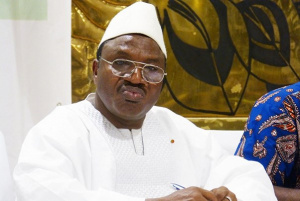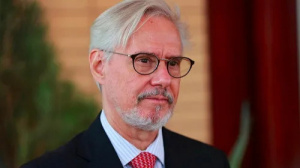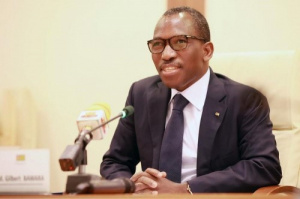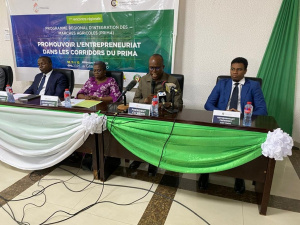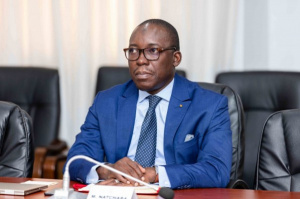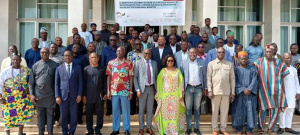Togo First
Togo: National Cotton Company Appoints New Board Chairman
Nana Nanfamé is the new Chairman of the Board of Directors for the New Cotton Company of Togo (NSCT). The state company officially disclosed the news in a press release issued on December 13, 2024.
Nanfamé replaces the late Simféitchéou Pré. The new board chairman had led the company from 2016 to 2020 before Olam Group took over. His extensive knowledge and experience are expected to help consolidate the company's progress and help it grow sustainably.
However, Nana Nanfamé will also face significant challenges. Notably, he must tackle the output decline recorded over the past years. This is as output is forecast to drop to 66,000 tonnes in the next season, from 67,000 tonnes this year.
Nanfamé's leadership will be crucial in turning the tables and achieving sustainable growth. His appointment shows the company's commitment to using experienced leaders to handle the complexities of Togo's cotton industry.
Esaïe Edoh
Togo: Government Introduces Strict Measures to Regulate Use and Transport of Radioactive Materials
The Togolese government announced on December 16 new measures to enhance the safety and security of transporting and using radioactive materials, as outlined in the law of June 10, 2020, on the safe and peaceful use of nuclear power.
This initiative supports nuclear medicine and radiotherapy projects across the country, both existing and under development. These projects address the growing medical needs of the Togolese people and issues impeding social and environmental protection.
Lomé plans to adopt new laws regulating the transport, storage, and use of nuclear and radioactive materials. These rules aim to help better protect patients, medical staff, and the public while ensuring facilities meet international safety standards set by the International Atomic Energy Agency (IAEA). Consequently, the transportation of nuclear and radioactive materials by land, air, and sea will be closely monitored to reduce risks.
Ayi Renaud Dossavi
Brazilian Diplomat Nei Bitencourt Dies in Togo
Nei Futuro Bitencourt, the Brazilian ambassador to Togo since 2021, passed on December 13, 2024, in Lomé. The Brazilian Ministry of Foreign Affairs confirmed the news.
Throughout his career, Nei Bitencourt served in various prestigious diplomatic posts, including embassies in Tokyo, London, Washington, Maputo, and the consulate-general in Nagoya. He was acknowledged for his consistent efforts to bring Brazil closer to sub-Saharan African countries.
During his tenure in Togo, Ambassador Bitencourt was instrumental in fostering cooperation in key sectors such as agriculture, military training, and culture. He ensured the continuation of food security projects and helped transfer Brazilian expertise to the region.
CIPRES: Togolese Labor Minister Gilbert Bawara Returns
Gilbert Bawara, the Togolese Minister of Labor and Social Protection, is the new head of the Council of Ministers of the Inter-African Conference on Social Security (CIPRES). He was formally appointed on December 13, at the end of the 37th council meeting in Lomé.
Bawara served as the Chairman of the CIPRES Council of Ministers for the first time in 2023. This year, however, he was replaced by Bassolma Bazié, Burkina Faso's Minister of Labor, and Social Protection.
During his term, Gilbert Bawara will play a critical role in strengthening social protection in the 17 CIPRES member States. He will focus on securing financial resources to guarantee the sustainability of social protection systems and on harmonizing the legislative and regulatory frameworks that oversee social welfare organizations and schemes. This initiative seeks to ensure coherence among the national policies of member countries, making it easier to implement shared mechanisms for the effective management of social funds.
The CIPRES was established on September 21, 1993, in Abidjan, Côte d'Ivoire. Headquartered in Lomé, Togo, the Council aims to establish rigorous and harmonized management of social welfare systems in member states. The CIPRES also conducts in-depth studies and proposes a unified legislative and regulatory framework among its members.
Esaïe Edoh
Togo Hosts First National Quality Days
Togo launched the first National Quality Days (JNQ) on December 13, 2024. Organized by the High Authority for Quality and the Environment (HAUQE), it was themed: “Quality, a lever for growth in national production.”
The two-day event included conferences, panels, and workshops on key topics such as metrology, certification, and the importance of standards for international markets.
In his opening speech, HAUQE President, Laré Arzouma Botre, noted: “In an increasingly competitive business environment, quality is not an option but a strategic necessity.”
Enselme Gouthon, Secretary General of the Coordination Committee for the Coffee and Cocoa Sectors (CCFCC), highlighted the achievements of Togolese cocoa at the international level. For example, he mentioned that six Togolese producers won medals at the Cocoa of Excellence Awards 2023.
The JNQ aimed to promote a quality culture in Togolese companies and public bodies.
Burkina Faso, Mali, and Niger Maintain Visa-Free Travel for ECOWAS Nationals
Mali, Niger, and Burkina Faso, the members of the Alliance of Sahel States (AES), will maintain the free movement of goods and people with the Economic Community of West African States (ECOWAS), despite their decision to leave the organization.
The AES countries announced this in a joint declaration adopted in Bamako on December 14, 2024. The declaration states, “The Confederation of Sahel States (AES) is a visa-free zone for all nationals of the member states of the Economic Community of West African States (ECOWAS).” It further clarifies that “ECOWAS nationals have the right to enter, circulate, reside, settle and leave the territory of AES member states in compliance with national laws in force.”
This will simplify travel and trade between the two blocs, ending the uncertainty that emerged after the AES States exited ECOWAS and subsequent political and diplomatic tensions.
Economic relations between the two blocs remain strong, particularly with countries like Togo. Lomé’s port is a major entry point for goods imported into the landlocked Sahelian nations.
Commenting on the joint declaration, General Assimi Goïta, President of the Transition in Mali and the Confederation, declared: “This initiative reflects a shared ambition for economic and political integration in a global context marked by growing security and economic challenges.”
The AES countries can still deny entry to individuals they deem ineligible under their laws. However, vehicles from ECOWAS states, whether for personal or commercial use, can move freely within the AES, provided they comply with existing rules.
Togo is improving its customs connections with its northern neighbors to become a major trade hub.
Regarding their decision to exit ECOWAS, the AES countries said it is “irreversible”.
Ayi Renaud Dossavi
Benin and Togo Unite to Enhance Cross-Border Agricultural Entrepreneurship
The inaugural meeting of the Regional Program for the Integration of Agricultural Markets (PRIMA) concluded on December 12, 2024, in Grand-Popo, Benin. This event, organized by the Chambers of Commerce and Industry of Togo and Benin (CCI-Togo and CCI-Benin), is a significant step forward in fostering agricultural entrepreneurship between the neighboring countries.
The three-day meeting focused on the theme: “Agricultural entrepreneurship in the Benin and Togo corridors: Current situation, issues, challenges, and prospects.” Participants assessed the current landscape of agricultural entrepreneurship in both nations while identifying strategies to create a sustainable and inclusive environment for family farming, particularly focusing on cross-border agricultural trade. Agriculture remains a crucial sector for both Benin and Togo's economies.
During the meeting, both Chambers reaffirmed their commitment to collaborate in enhancing their roles within the agricultural markets of the Economic Community of West African States (ECOWAS), as part of the African Continental Free Trade Area (AfCFTA). The initiative will receive support from the International Fund for Agricultural Development (IFAD), which is set to provide technical and financial assistance for achieving the program's objectives.
Françoise Assogba, Secretary General of Benin's Ministry of Agriculture, Livestock and Fisheries, stated that this project marks a pivotal advancement in integrating agricultural markets between Togo and Benin. She emphasized that the Beninese government is determined to actively contribute to a sustainable agricultural future by leveraging the synergies fostered through this bilateral cooperation.
This initial meeting signifies the beginning of ongoing exchanges between the two Chambers, which share a unified vision for agricultural development. “These initiatives aim to strengthen market interconnections, enhance living conditions for small-scale farmers, and stimulate economic growth in both countries, all within a framework of regional solidarity,” asserted representatives from both chambers.
Esaïe Edoh
Togo Recognizes 79 Private Universities Amid Higher Education Reforms
The Togolese government has officially recognized 79 private higher education institutions. A list recently published by the Ministry of Higher Education and Research indicates that 68 of the schools are located in Greater Lomé. The remaining 11 are in the interior regions of the country.
The recognized schools comply with the government’s standards, undergo regular inspections, and adhere to regulations enacted by the Council of Ministers on October 30, 2024. These regulations mandate that training programs align with job market needs and comply with standards set by the African and Malagasy Council for Higher Education (CAMES).
The list was released to help students who seek to enroll in schools with adequate academic and international standards and avoid non-accredited schools. The government also hopes that the move will drive unrecognized institutions to meet official requirements, thus contributing to greater quality of higher education in Togo.
Kanka-Malik Natchaba, the Minister for Higher Education, stated that this initiative is crucial for restoring the credibility of Togolese diplomas and ensuring quality training for students. This move comes amid ongoing criticism of the private higher education sector for issues such as insufficient academic rigor and inadequate teaching staff at some institutions.
Togo has two public universities, for now. However, the government plans to establish a university per economic region to accommodate the rising demand for higher education and unclog existing institutions.
Esaïe Edoh
Togo: Eight New Trade Inspectors Sworn in to Enhance Consumer Protection
In Togo, eight new trade inspectors dedicated to consumer protection were sworn in on December 13, 2024, at the Lomé court. The chosen eight include five inspectors and three controllers. The inspectors are: Atekpe Makiliwè, Oganto Kokou Ananzè, Gadagbui Kossi Zikpi, Laméga Matiba Alliance, and Katcha Hèzouwè. The controllers are: Souka Atsou, Takassi Gnon Moumouni, and Atcha Yaliou.
The newly appointed officials pledged before the judge to ensure the quality and compliance of products sold within the national territory. “We have a consumer protection function. This involves checks in the field, the withdrawal of counterfeit or unfit-for-consumption products, the recording of offenses and their sanction,” explained Atekpe Makiliwè, Director of Internal Trade and Competition at the Ministry of Commerce.
The swearing-in ceremony concluded a process that included specialized training and a ministerial appointment order under legal requirements. The new inspectors are expected to enhance the capacities of the Ministry of Commerce, particularly in monitoring trade practices.
The day before the ceremony, Minister of Commerce Rose Kayi Mivedor had met with key importers of staple products such as rice and oil to ensure their availability at affordable prices during the festive season when consumption typically rises.
Ayi Renaud Dossavi
Togo: New 2024-2034 Decentralization Strategy Validated
Togo’s new decentralization strategy, spanning 2024 to 2034, was validated last week in Kara. Held on December 12, the validation workshop gathered key stakeholders in decentralization, including governors, prefects, mayors, general secretaries of prefectures and communes, and representatives of traditional chieftaincies.
The new strategy, featuring major reforms, aims to revitalize the decentralization process. It is the fruit of a thorough assessment of the decentralization efforts initiated in 2016. This assessment provided a comprehensive overview of current progress, challenges, and opportunities to enhance decentralization by 2034.
The new strategy prioritizes several key areas, such as reinforcing local governance, improving the funding and autonomy of local authorities, effectively transferring powers from the State, and promoting citizen participation in local affairs.
According to Pali Essossinam, Director of Decentralisation and Local Authorities, decentralization is a dynamic process that requires constant attention and adaptability to effectively meet citizens' expectations.
The National Decentralisation Strategy should offer a strategic framework that enhances local actors’ capacities and fosters balanced territorial development.
Several partners will support the actions planned under the new strategy–technically and financially. For example, the German Cooperation (GIZ) backs the strategy through the Decentralisation and Good Governance Programme (ProDeG IV).
The national decentralization strategy has been validated as Togo prepares to conclude the first term for elected municipal representatives in 2025.
Esaïe Edoh

